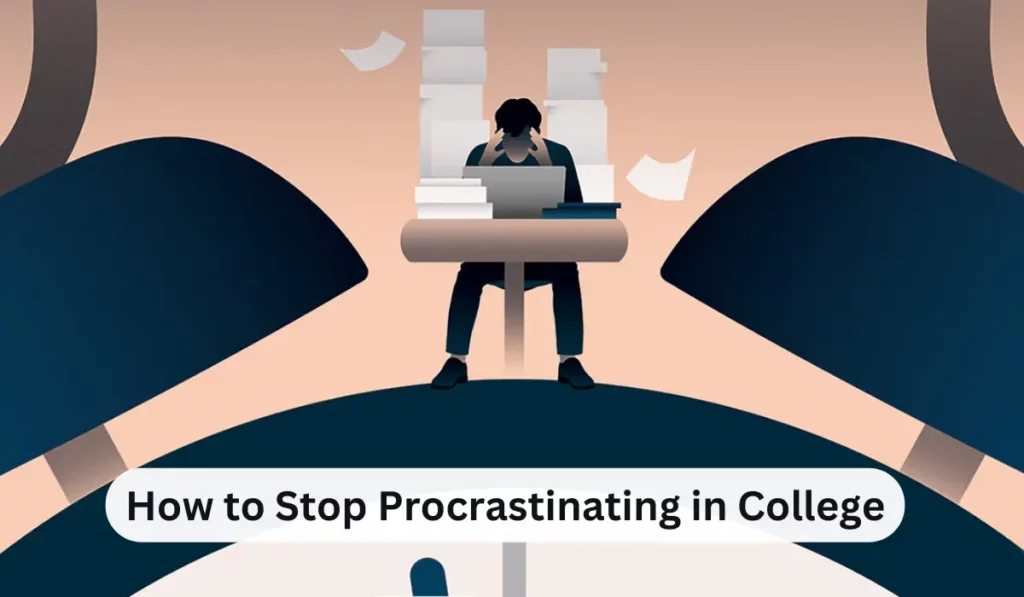Almost every college student suffers from procrastination and putting off the assignments until the final deadline. So, they always wonder about how to stop procrastinating in college.
Procrastination is delaying complex and important tasks until the final deadline. For college students, it is delaying the assignments, exam preparation, or other projects until the final deadline. According to a 2007 analysis, 95% of college students procrastinate. Another report published on psychologytoday.com states that students who procrastinate usually score lower grades.
In this article, I will lay down practical advice on how to stop procrastinating in college. Since it affects not only you but almost all the students, I will give tips on how to use support from friends to tackle it. Let’s start.
Acknowledge that you are procrastinating.
Be aware and acknowledge whenever you are procrastinating. Once you admit that you were procrastinating, you can take further steps to stop it and change this habit.
Mastering effective techniques on how to study while working requires strategic planning, efficient time management, and the ability to blend work commitments with dedicated study periods to achieve academic goals.
Select the environment for study wisely.
Select a place that is conducive for assignments or studying. Places like beds, couches, etc., are comfortable but not perfect for studying. Choose a spot in your room for studying and do nothing else in that spot. If you always study in that spot, your mind will associate that place with studying and cooperate with you.
Be aware of the deadlines.
Be aware of the deadlines for assignments or college projects and plan accordingly. You should have the deadlines in your mind while planning your assignments and projects. Plan to finish them early to save time.
Set achievable goals
Set achievable goals at the beginning of the task. For instance, if you have the assignment of writing 10 pages of theory on some topic, start by setting the goal of writing 2 paragraphs. Then, you should focus and work until you complete 2 paragraphs. Once you achieve the target, set another short and achievable target. This process of achieving small goals will motivate you to finish the assignment quickly.
Developing self-discipline for students is a cornerstone in achieving academic success, as it cultivates consistent study habits, effective time management, and resilience in the face of challenges.
Know when you are at best.
Some people feel energetic and can work in the early morning. In contrast, others prefer nights for work. Knowing what works for you and choosing that time of the day for finishing the assignments is beneficial in tackling procrastination.
Understanding the importance of life-work balance for adult students is crucial, as it involves juggling multiple responsibilities while prioritizing self-care, effective time management, and academic pursuits.
Avoid Distractions
Keep unnecessary devices away from you while working on your assignments. Turn off your phone’s notifications to avoid getting disturbed. Choose a quiet and dedicated place to work.
Embrace group study
You can choose to study with friends to tackle procrastination. Choose friends who want to sincerely study and not create distractions while studying.
Reward yourself
Reward yourself when you finish an assignment or project. Rewarding yourself will keep you excited about college tasks and studies. You can reward yourself by allowing you to do something that you enjoy.
Be kind to yourself.
Procrastination is an unconscious habit. It can take some time to be changed. In the journey, you may fail initially. If you fail, be kind to yourself instead of beating yourself up. Pick yourself up, learn the lesson, and implement it.
Prioritizing stress management for adult students is essential in navigating the demands of academia, work, and personal life, fostering resilience and overall well-being while pursuing higher education
Final Words
Procrastination is common among college students. It eats up a lot of your time. You can change this habit by making up your mind and following through the practical steps discussed in this article. Remember, the hardest part is to start something. So, start by setting small targets, and once you achieve them, you will have the motivation to keep going.






